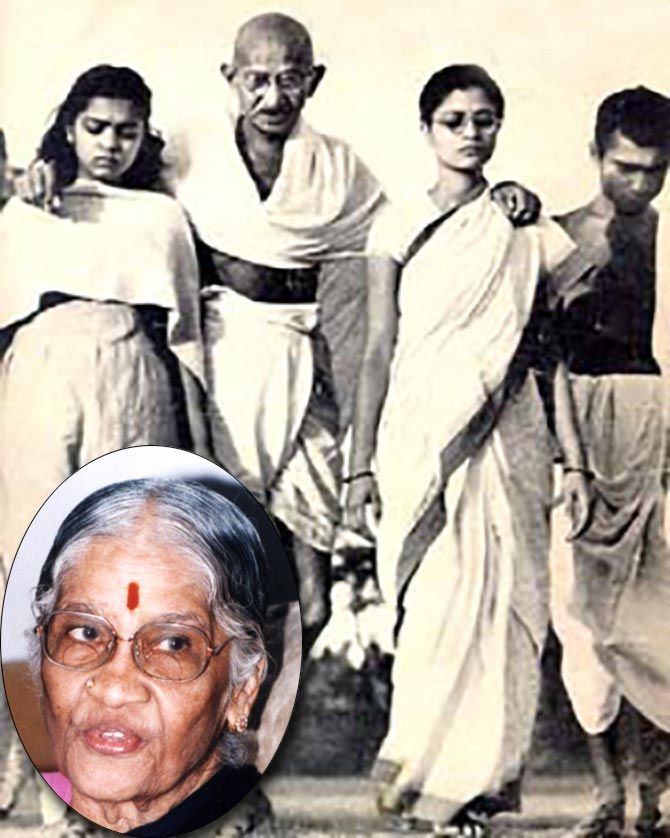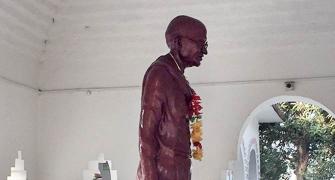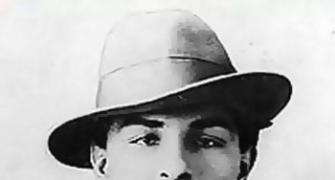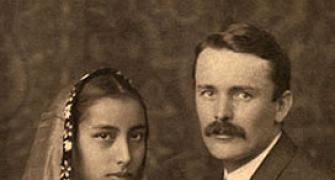'Those days, none of the leaders thought of amassing wealth.'
'All of them wanted to sacrifice their all for the country.'
'There are many who didn't have any money, but sacrificed their lives for the country.'
'There are many who spent their own money and worked for the country.'
'There are many more about whom we do not even know what they had done; they did everything so silently and selflessly.'

In 2002, when Rediff.com's Shobha Warrier spoke to Dr Sarojini Varadappan, the late Tamil Nadu chief minister M Bhaktavatsalam's daughter was 81 years old.
A young witness to the struggle and hardship her father and other prominent leaders from south India underwent during the Quit India movement, Dr Varadappan recalled those tension-filled days in a feature first published on Rediff.com on August 7, 2002:
There were three major movements during that period; the Civil Disobedience Movement, the Non-Cooperation Movement and, finally, the Quit India Movement.
During our childhood, we hardly saw our father. Most of the time, he was either away or in jail. As a matter of fact, my sister (former Union minister Jayanthi Natarajan's mother) was born when my father was in jail during the Civil Disobedience Movement; he saw her only when she was three!
There was a kind of unknown fear in the minds of us children all the time. We didn't know what news awaited us when we came back from school.
We were so frightened those days that we always expected some bad news. One day, when we reached home, we were told our father was arrested and taken to jail.
I want to tell you about an incident that took place when we were still in school; I think it was during the Civil Disobedience Movement.
As we were returning home, we saw a big crowd in front of our house. We were frightened because we also saw many policemen.
In those days, if the police were suspicious of anyone, they would search their house and a search party was at our house that day. They ransacked the place even though only my mother was at home at the time.
I still remember how they destroyed a portrait of Bhagat Singh, which my father had kept in his office room. That was the only objectionable thing they had managed to find.
I was 20 years old when the Quit India Movement began, but everything is still fresh in my mind. Several members of my family were in prison during that period.
My father Bhaktavatsalam and his uncle Muthuranga Muthaliar were in jail. As was my maternal uncle Alagesan who had been to Dandi and joined the Salt Satyagraha movement when he was in college.
As he was very young, Mahatma Gandhi asked him to go back and join Rajaji (Chakravarti Rajagopalachari, the first Governor General of Independent India). So he participated in the Salt Satyagraha movement at Vedaranyam.
In 1942, the three of them and many other leaders had gone to Bombay to attend the All India Congress Committee meeting. It was there that they decided to start the Quit India Movement. After the meeting, all them boarded a train to return to Madras.
It was late in the night and my brother had gone to receive my father and uncles at the railway station. But they, along with other Congress leaders like Satyamoorthy, Neelam Sanjeeva Reddy and V V Giri (both later Presidents of India), were arrested the moment they got down from the train.
K Kamaraj was arrested at Avadi even before the train reached Madras.
We were eagerly waiting to see my father and were shocked at the news. We came to know the police would not take them to Vellore jail that night. They were kept at the Nungambakkom police station. I get upset even today when I pass the station.
My father's uncle told the police he would only eat food cooked at home as it was amavasya, Finally, the police relented. We were allowed to go there with food and thus got a chance to meet our father.
The very next day, all of them were taken to Vellore jail. On all the previous occasions, the police used to allow us to meet the prisoners once a month. It used to be a Saturday.
We used to go to Vellore in a car. The big gate would be open on that day. All the A class prisoners would be brought into a big hall where we would meet them for half an hour.
When he was kept in Trichy jail on an earlier occasion, we used to go to Trichy by train, stay there, meet him for half an hour and come back.
My mother even visited him when she was eight months pregnant with my sister. I was 11 years old then.
The Quit India Movement was so revolutionary that the police did not allow any meetings with the prisoners. Earlier, they used to even censor the letters. Sometimes, we used to get letters from our father with certain portions tarred! They would censor whatever they felt was objectionable.
But during the Quit India movement, the prisoners were not allowed to send letters either. The police didn't want us to know where they were. Despite all this, we would manage to get some news about them.
A month or two passed like this. Then, Satyamoorthy's daughter Lakshmi, who was studying at Annamalai University, heard that the senior leaders would be moved from Vellore. She rushed to our house to give us the news.
It was 11.30 at night. She told us they would be brought to Central Station in the morning, but didn't know where they would be taken from there.
Early in the morning, we made lots of idlis, sambhar and coffee and went to Central Station. But the police were rude and would not let us meet the prisoners. We pleaded with them.
Then, we saw the carriage kept far away from the platform. After hours of begging, they finally allowed us to meet them and feed them.
No one -- neither my father or uncles or Satyamoorthy -- knew where they were being shifted. We were given only half an hour with them. Then the police came and drove us away.
It was only 10 or 15 days later that we got a letter from my father. He said they were first taken to Nagpur and then moved to Amravati in Maharashtra in a police van. There was no way we could send any mail to him.
Satyamoorthy, who was very fond of his only daughter, perhaps missed her and had a massive heart attack. He was sent back on parole and was soon admitted to hospital. He wanted to see his daughter's wedding before his death. So the wedding was fixed, but the poor man passed away before it could take place.
This was how our life was in those days!
My father and the others were released in 1944, I think. Anyway, we didn't see him for many years. As soon as he was released, he came straight home. Soon after, an interim government was formed and he became a minister in the Prakasam ministry.
The Hindi Prachar Sabha was the hub of all activities in those days. It was there that letters from leaders like Aruna Asaf Ali, Achyut Patwardhan, etc, came to youngsters from all over India.
Young pracharaks distributed the letters, pamphlets, etc, without the knowledge of the police.
I still remember how the police searched for Bal Gangadhar Apte, a young Maharashtrian pracharak who had gone underground to prepare materials to be distributed.
After hiding at many places, Apte came to our house, which was just behind the Hindi Prachar Sabha and hid there.
Whenever we had a visitor, he would go to another room and lock himself up. He was with us for a month, but nobody knew about his presence. We children quite enjoyed having somebody stay 'underground' at home.
One of the sub-inspectors from the nearby police station was my mother's classmate. He used to visit us often to enquire after our father and, whenever he came, he would spend at least an hour talking to my mother.
One day, he bragged, 'You know this man Apte has gone underground, but we will catch him soon, wherever he is. He doesn't know our strength.' Apte was hiding in the next room. We had to struggle hard to control our laughter.
Though I didn't go to jail, I had the good fortune to participating in the freedom struggle by attending meetings, grouping youngsters, organising prayer meetings and working for others.
When Mahatma Gandhi came here soon after his release from jail, I was one of the thousand volunteers serving him. He stayed in one of the cottages inside the Hindi Prachar Sabha and only those who knew Hindi -- I was one of them -- had the privilege of serving him.
Every evening, we used to have a prayer meeting that would be attended by thousands of people. There was no police to control the crowd; we did all that. When Gandhiji said 'Do minute ki shanti (Two minutes of silence)' there would be pin-drop silence.
I do not know what kind of magic he had, but people listened to him. The magnetic power he had was amazing.
After the meeting, all the volunteers had to move around with a hundi (collection box) to collect money for Harijan welfare.
After the prayer at seven, we would go to the cottage and deposit all the hundis.
Early in the morning, Gandhiji would sit on the veranda in an easy chair. We would sit down and start counting the money we had collected.
Every single paisa was accounted for and it was done every day.
It was a great lesson for me. This is how I learnt accountability and credibility and it has helped me a lot in my activities as a social worker.
I also learnt punctuality and simplicity from him.
In those days, none of the leaders thought of amassing wealth. All of them wanted to sacrifice their all for the country.
My father was a minister for 25 years before he became chief minister, but he would sell some of our property to cover the election expenses every five years. Fortunately, we had land to sell.
Similarly, when Kamaraj was released from jail after the Quit India movement, he had nowhere to stay. So he stayed with us in our small house for one month! That was how the leaders of yesterday lived.
There are many who didn't have any money, but sacrificed their lives for the country.
There are many who spent their own money and worked for the country.
There are many more about whom we do not even know what they had done; they did everything so silently and selflessly.
But the country has forgotten all of them.
Having seen those leaders, I am very disappointed with the way things are going today.
The children of today have no faith in politics or political leaders. They do not know much about the freedom struggle. It could also be because we and our leaders failed to teach the second generation about the freedom movement.









